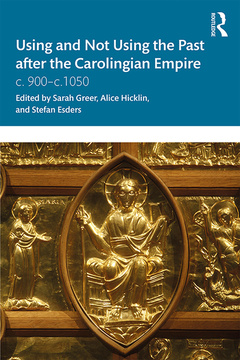Using and Not Using the Past after the Carolingian Empire c. 900–c.1050
Coordonnateurs : Greer Sarah, Hicklin Alice, Esders Stefan

Using and Not Using the Past after the Carolingian Empire offers a new take on European history from c.900 to c.1050, examining the ?post-Carolingian? period in its own right and presenting it as a time of creative experimentation with new forms of authority and legitimacy.
In the late eighth century, the Frankish king Charlemagne put together a new empire. Less than a century later, that empire had collapsed. The story of Europe following the end of the Carolingian empire has often been presented as a tragedy: a time of turbulence and disintegration, out of which the new, recognisably medieval kingdoms of Europe emerged. This collection offers a different perspective. Taking a transnational approach, the authors contemplate the new social and political order that emerged in tenth- and eleventh-century Europe and examine how those shaping this new order saw themselves in relation to the past. Each chapter explores how the past was used creatively by actors in the regions of the former Carolingian Empire to search for political, legal and social legitimacy in a turbulent new political order.
Advancing the debates on the uses of the past in the early Middle Ages and prompting reconsideration of the narratives that have traditionally dominated modern writing on this period, Using and Not Using the Past after the Carolingian Empire is ideal for students and scholars of tenth- and eleventh-century European history.
1) Introduction; Past Narratives; 2) The Future of History after Empire; 3) Remembering Troubled Pasts: Episcopal Deposition and Succession in Flodoard’s History of the Church of Rheims; 4) In the Shadow of Rome: After Empire in the late-tenth-century Chronicleof Benedict of Monte Soratte; 5) Infiltrating the Local Past: Supra-regional Players in Local Hagiography from Trier in the Ninth and Tenth centuries; 6) After the Fall: Lives of Texts and Lives of Modern Scholars in the Historiography of the Post-Carolingian World; Inscribing Memories;7) How Carolingian was Early Medieval Catalonia?; 8) Orchestrating Harmony: Litanies, Queens, and Discord in the Carolingian and Ottonian Empires; 9) Models of marriage charters in a notebook of Ademar of Chabannes (ninth-eleventh century); 10) All in the Family: Creating a Carolingian Genealogy in the Eleventh Century; 11) ‘Charles’s stirrups hang down from Conrad’s saddle’: Reminiscences of Carolingian Oath Practice under Conrad II (1024‒1039); Recalling Communities; 12) Notions of Belonging. Some Observations on Solidarity in the Late- and Post Carolingian World; 13) Bishops, Canon Law, and the Politics of Belonging in Post-Carolingian Italy, c. 930-c. 960; 14) Migrant Masters and their Books. Italian Scholars and Knowledge Transfer in post-Carolingian Europe; 15) The Dignity of Our Bodies and the Salvation of Our Souls. Scandal, Purity, and the Pursuit of Unity in Late Tenth-Century Monasticism; 16) Law and Liturgy: Excommunication Records, 900-1050
Sarah Greer is a post-doctoral fellow at the University of St Andrews. Her research explores the relationships between memory and power in the long tenth century.
Alice Hicklin is a post-doctoral fellow at the Freie Universität Berlin. Her research compares legal and diplomatic practices throughout western Europe in the early middle ages.
Stefan Esders is professor of Late Antique and Early Medieval History at the Freie Universität Berlin, specialising in legal history. He has recently co-edited East and West in the Early Middle Ages: The Merovingian Kingdoms in Mediterranean Perspective (2019) with Yaniv Fox, Yitzhak Hen and Laury Sarti.
Date de parution : 10-2019
15.6x23.4 cm
Date de parution : 10-2019
15.6x23.4 cm
Thème d’Using and Not Using the Past after the Carolingian Empire :
Mots-clés :
Otto III; after empire; Henry III; empire; Frankish Kingdom; Carolingian Empire; Frankish Empire; 900-1050; Royal Frankish Annals; historiographies; Hugh Capet; death; Berengar II; feudal revolution; Laudes Regiae; european kingdoms; Carolingian Dynasty; Charlemagne; Conrad II; franks; Salian Dynasty; frankish; West Frankish Kingdom; christian society; Canon Law Collection; medieval catalonia; East Frankish Kingdom; Iberia; Otto II; Southern Muslims; Eleventh Century Europe; Ottonian kingship; liturgical practice; Ottonian Rule; queenship; West Frankish; Emperor Otto II; Earlier Eleventh Centuries; Excommunication Rites; Lothar II; St Maximinus; Benedict of Monte Soratte; Carolingian Minuscule; East Frankia; Carolingian Family; History of the Church; Pseudo-Isidorian Decretals; European history; tenth century; eleventh century; medieval history; post-Carolingian period; social legitimacy; medieval European kingdoms



